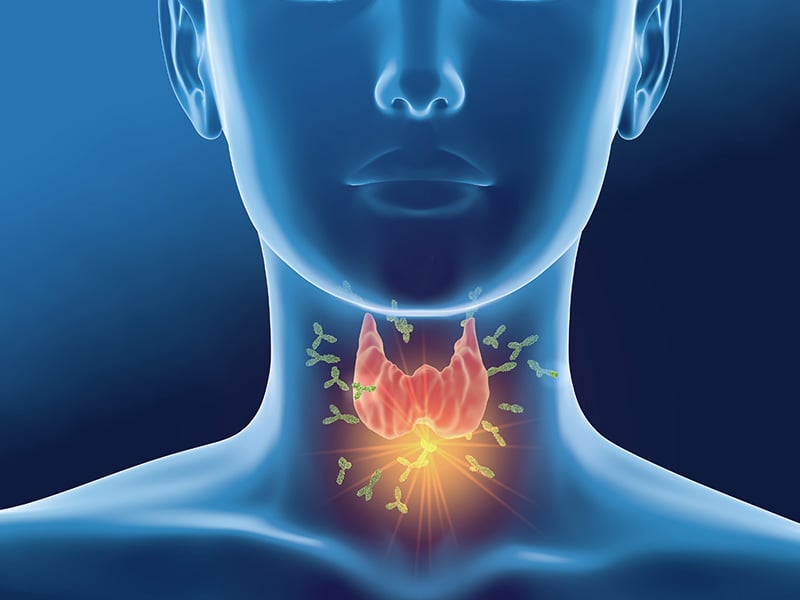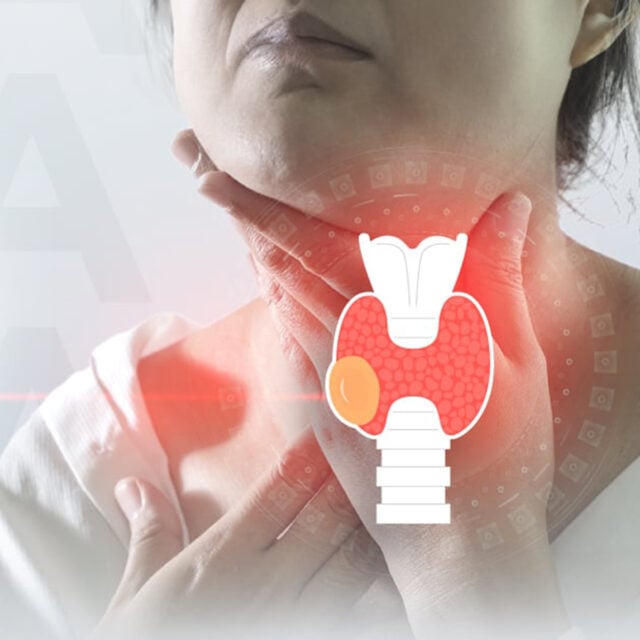The thyroid gland is a butterfly-shaped gland located in the front of the neck. It is a vital hormone gland that plays several major roles in the metabolism, growth and development of the body. The thyroid gland helps to regulate body functions by constantly releasing a steady amount of thyroid hormones into the bloodstream. Hypothyroidism (underactive thyroid) is a condition in which the thyroid gland does not produce sufficient thyroid hormones, causing metabolism to slow down, weight gain, fatigue and other symptoms. Hashimoto’s thyroiditis or Hashimoto’s disease is an autoimmune disorder in which the immune system creates antibodies that damage the thyroid gland, leading to acute or chronic inflammation of the thyroid gland. Inflammation from Hashimoto’s thyroiditis often leads to hypothyroidism. Hashimoto’s thyroiditis is the most common cause of hypothyroidism. Although Hashimoto’s thyroiditis is a rare condition and it primarily affects middle-aged women, it can also attack men and women of any age including children. Therefore, being aware of its signs and symptoms remains important to seek accurate diagnosis and appropriate treatment in a timely manner.
Get to know Hashimoto’s thyroiditis
Hashimoto’s thyroiditis is a condition in which immune system produces antibodies to attack the thyroid gland. It is an autoimmune disease that gradually leads to chronic inflammation of the thyroid gland. Hashimoto’s thyroiditis is the most common cause of hypothyroidism. Inflammation caused by Hashimoto’s disease is often characterized by widespread chronic lymphocytic thyroiditis (inflammation of lymphocyte cells) in the thyroid tissue.
Causes and risk factors
The major cause of Hashimoto’s thyroiditis is thought to be genetic involvement. Other contributing factors include heredity, sex and age. Hashimoto’s thyroiditis affects more women than men. The higher incidence is found correlatively in people with increasing age. However, it can also strike children and teenagers. Hashimoto’s disease often runs in families. The risk of getting disease is higher if a person has had other autoimmune diseases.
Signs and symptoms
Early on, symptoms may not be noticed. Hashimoto’s disease typically progresses slowly over years and causes chronic thyroid damage, leading to a drop in thyroid hormone levels in the blood. Over time, the thyroid gland may enlarge, forming a painless goiter. The signs and symptoms of hypothyroidism usually include:
- Unexplained weight gain
- Swelling or a puffy face
- Fatigue
- Sluggishness
- Constipation
- Pale, dry skin
- Increased sensitivity to cold
- Muscle aches, cramping or joint pain
- Hoarseness
*** In some patients, only low thyroid hormone levels are detected without presenting clinical symptoms (known as subclinical hypothyroidism).
Diagnosis
Diagnosis of Hashimoto’s thyroiditis is primarily based on signs and symptoms as well as the results of blood tests which include these 2 tests:
- A hormone test. Blood tests can determine the amount of hormones produced by thyroid gland and pituitary gland. If thyroid is underactive, the levels of thyroid hormones are low. At the same time, the level of thyroid-stimulating hormone (TSH) is elevated since the pituitary gland tries to stimulate thyroid gland to produce more thyroid hormone. Early stage of Hashimoto’s thyroiditis, TSH level might be raised and a thyroxine hormone (T4) or free T4 and a triiodothyronine hormone (T3) subsequently decrease.
- An antibody test. Due to Hashimoto’s thyroiditis is an autoimmune disorder, the cause involves the production of certain antibodies. A blood test may confirm the presence of anti-thyroglobulin antibodies (anti-Tg) or/and antibodies against thyroid peroxidase (TPO antibodies), an enzyme normally found in the thyroid gland that plays an important role in the production of thyroid hormones.
Treatment
If Hashimoto’s thyroiditis causes thyroid hormone deficiency, replacement therapy with thyroid hormone is indicated. This usually involves daily use of the synthetic thyroid hormone levothyroxine which is identical to thyroxine hormone (T4). The oral medication with appropriate dosage regimen restores adequate hormone levels and reverses all the symptoms of hypothyroidism including reducing the size of goiter.
In patients without clinical symptoms (subclinical hypothyroidism) or patients who have developed goiters without the evidence of thyroid hormone deficiency, the endocrinologist may suggest a regular follow-up for monitoring signs and symptoms as well as thyroid hormone levels. Medications might be considered and started if an indication applies. In general, the prognosis of Hashimoto’s thyroiditis is excellent with proper treatment. Restoration of thyroid hormone levels with medical treatment substantially helps to reverse the signs and symptoms of hypothyroidism. Nevertheless, regular follow-up is required in order to closely monitor disease progression. Without treatment, hypothyroidism can worsen over years, potentially leading to organ damage and serious illness.












